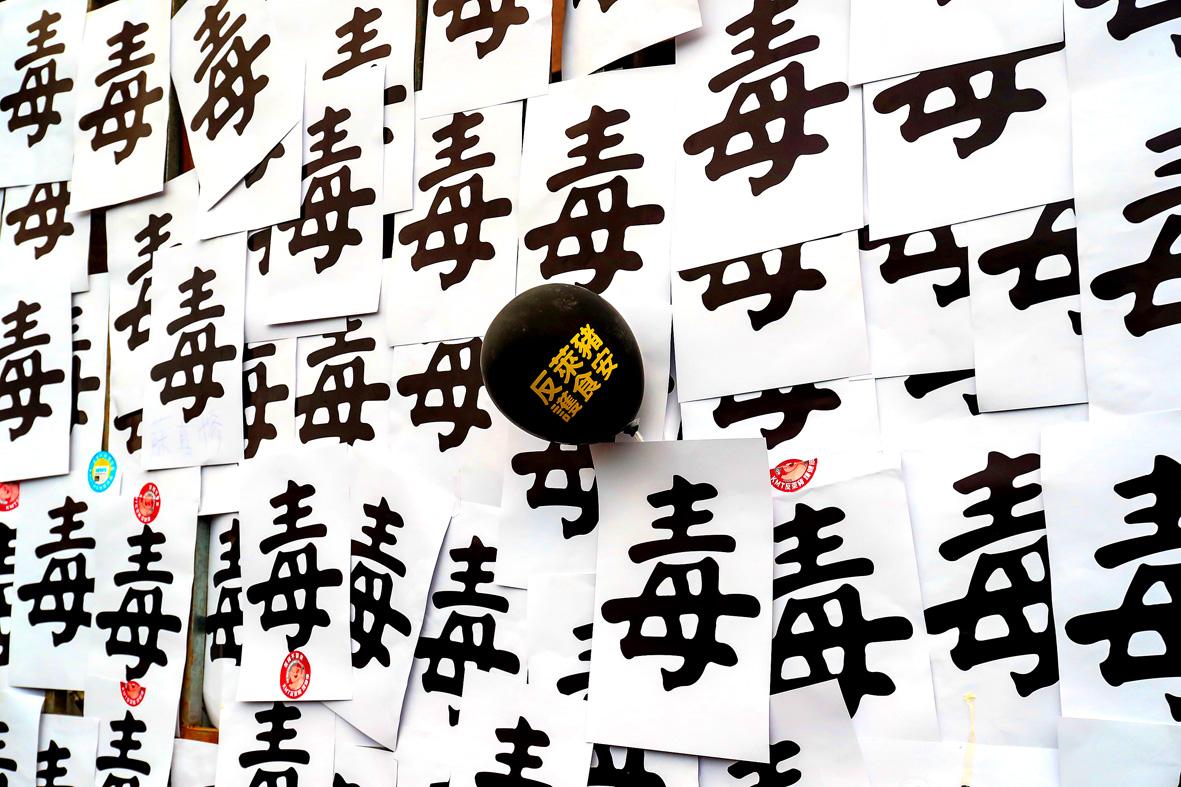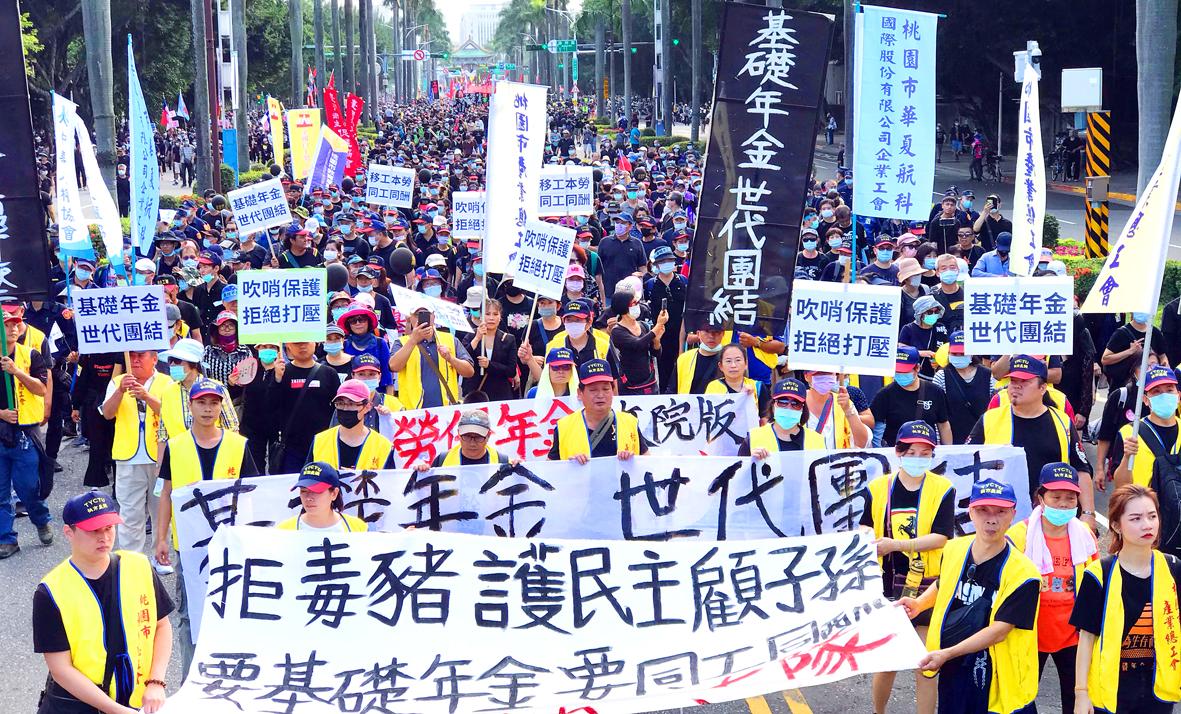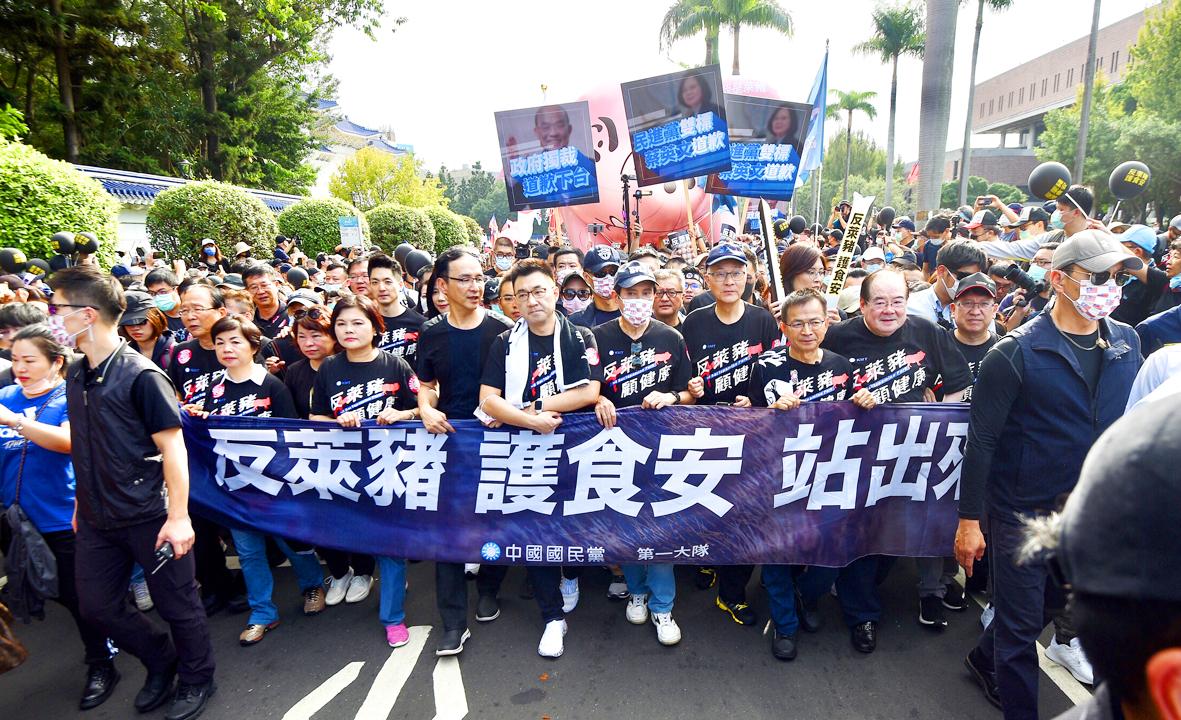Tens of thousands of people in Taipei yesterday took part in the “Autumn Struggle” (秋鬥) — an annual protest march by labor groups — but with this year’s focus on rejecting the government’s plan to allow imports of US pork containing ractopamine residue.
“Against poisonous pork, against double standards, against a party-state,” the protesters, mostly wearing black, chanted in front of the rally’s main stage on Ketagalan Boulevard at about noon, before a parade set off at 2pm.
Autumn Struggle spokesperson Lee Chien-cheng (李建誠) said this year’s march was divided into three teams, with the first team urging food safety and labor rights, the second concentrating on environmental protection and education issues, and the third urging proper land use and freedom of speech.

Photo: Chiang Ying-ying, AP
The protesters collectively called on President Tsai Ing-wen (蔡英文) to revoke her executive order to allow imports of US pork containing ractopamine, and for Premier Su Tseng-chang (蘇貞昌) to step down over government policies that caused public complaints, Lee said.
A small, black stage decorated with white flowers was also set up on the back of a truck, mimicking a funeral hall, and black banners hung on the sides read “Ractopamine-containing pork poisoned Taiwan, democracy is dead,” “Say farewell to the health we are about to lose and mourn over Taiwan’s freedom of speech.”
The rally organizers had said political parties were welcome to join the parade, but politicians would not be allowed to speak on the main stage.

Photo: CNA
The Chinese Nationalist Party (KMT) set up its own stage at Liberty Square, while the Taiwan People’s Party (TPP) called a news conference outside the Chiang Kai-shek Memorial Hall MRT Station.
Two large inflatable pigs flanked the KMT’s stage, while KMT Chairman Johnny Chiang (江啟臣), former president Ma Ying-jeou (馬英九), former vice president Wu Den-yih (吳敦義) and former New Taipei City mayor Eric Chu (朱立倫) addressed the crowd.
“The government does not accept supervision, does not communicate and does not explain, and it is being arrogant and overbearing,” Chiang said.

Photo: Liu Hsin-de, Taipei Times
As Tsai had asked then-president Ma to take part in a televised debate over the Economic Cooperation Framework Agreement in 2010, the KMT is now urging Tsai to accept a televised debate on her plan to lift the ban on US pork containing ractopamine.
Ma said more than 160 countries ban the use of ractopamine in animal feed and more people in the US are now against it as well, so Tsai should renegotiate with the US and tell them that Taiwanese welcome US pork, but not pork containing ractopamine.
The KMT said that more than 20,000 supporters joined its protest.

Photo: Peter Lo, Taipei Times
The TPP said that more than 3,000 people joined its rally supporting its two main demands of “source management and clear labeling” on imported US pork containing ractopamine.
TPP Chairman Ko Wen-je (柯文哲), who is also Taipei mayor, was absent on the grounds that he has to uphold administrative neutrality.
TPP Secretary-General Hsieh Li-kung (謝立功) accused the Democratic Progressive Party (DPP) of using double standards, as it was against the importation of pork containing ractopamine when it was in the opposition.

Photo: Chiang Ying-ying, AP
Want Want China Times Media Group (旺旺中時集團) founder and CTi News owner Tsai Eng-meng (蔡衍明) also marched, wearing a black T-shirt that read “I want freedom of speech,” as he accused the DPP government of neglecting public opinion and curtailing freedom of speech.
The National Communications Commission last week refused to renew CTi News’ broadcast license, citing frequent contraventions of media regulations, far exceeding other channels.
The march ended at about 4pm in front of the DPP’s headquarters, where participants pasted paper signs that read “poison” on the fence outside the party’s building.
Organizers said about 50,000 people participated in the rally.
Presidential Office spokesman Xavier Chang (張惇涵) said the government would humbly listen to people’s voices and continue to communicate with the public, but urged the opposition to discuss the issues rationally in the legislature.
Additional reporting by CNA

DEFENDING DEMOCRACY: Taiwan shares the same values as those that fought in WWII, and nations must unite to halt the expansion of a new authoritarian bloc, Lai said The government yesterday held a commemoration ceremony for Victory in Europe (V-E) Day, joining the rest of the world for the first time to mark the anniversary of the end of World War II in Europe. Taiwan honoring V-E Day signifies “our growing connections with the international community,” President William Lai (賴清德) said at a reception in Taipei on the 80th anniversary of V-E Day. One of the major lessons of World War II is that “authoritarianism and aggression lead only to slaughter, tragedy and greater inequality,” Lai said. Even more importantly, the war also taught people that “those who cherish peace cannot

STEADFAST FRIEND: The bills encourage increased Taiwan-US engagement and address China’s distortion of UN Resolution 2758 to isolate Taiwan internationally The Presidential Office yesterday thanked the US House of Representatives for unanimously passing two Taiwan-related bills highlighting its solid support for Taiwan’s democracy and global participation, and for deepening bilateral relations. One of the bills, the Taiwan Assurance Implementation Act, requires the US Department of State to periodically review its guidelines for engagement with Taiwan, and report to the US Congress on the guidelines and plans to lift self-imposed limitations on US-Taiwan engagement. The other bill is the Taiwan International Solidarity Act, which clarifies that UN Resolution 2758 does not address the issue of the representation of Taiwan or its people in

Taiwanese Olympic badminton men’s doubles gold medalist Wang Chi-lin (王齊麟) and his new partner, Chiu Hsiang-chieh (邱相榤), clinched the men’s doubles title at the Yonex Taipei Open yesterday, becoming the second Taiwanese team to win a title in the tournament. Ranked 19th in the world, the Taiwanese duo defeated Kang Min-hyuk and Ki Dong-ju of South Korea 21-18, 21-15 in a pulsating 43-minute final to clinch their first doubles title after teaming up last year. Wang, the men’s doubles gold medalist at the 2020 and 2024 Olympics, partnered with Chiu in August last year after the retirement of his teammate Lee Yang

The Philippines yesterday criticized a “high-risk” maneuver by a Chinese vessel near the disputed Scarborough Shoal (Huangyan Island, 黃岩島) in a rare incident involving warships from the two navies. The Scarborough Shoal — a triangular chain of reefs and rocks in the contested South China Sea — has been a flash point between the countries since China seized it from the Philippines in 2012. Taiwan also claims the shoal. Monday’s encounter took place approximately 11.8 nautical miles (22km) southeast” of the Scarborough Shoal, the Philippine military said, during ongoing US-Philippine military exercises that Beijing has criticized as destabilizing. “The Chinese frigate BN 554 was